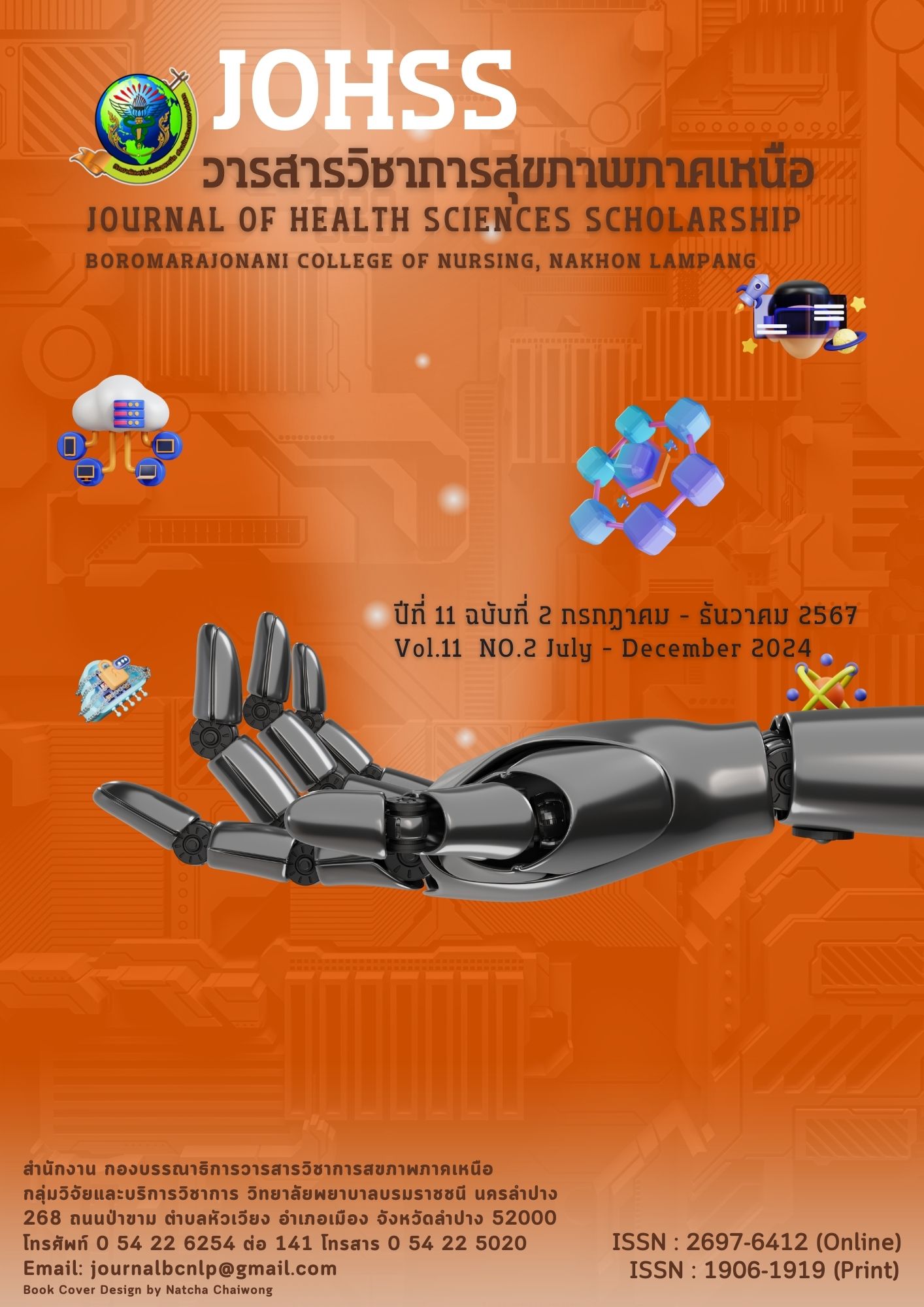ผลของโปรแกรมการส่งเสริมความรอบรู้ด้านการคิดเชิงบริหารเด็กปฐมวัย ต่อความรู้ และพฤติกรรมการส่งเสริมการคิดเชิงบริหารในครูผู้ดูแลเด็ก จังหวัดลำปาง
คำสำคัญ:
เด็กปฐมวัย, ความรู้คิดเชิงบริหาร, ครูผู้ดูแลเด็กบทคัดย่อ
การวิจัยครั้งนี้เป็นกึ่งทดลอง เพื่อศึกษาผลของโปรแกรมการส่งเสริมความรอบรู้ด้านการคิดเชิงบริหารในเด็กปฐมวัย ต่อความรู้ และพฤติกรรมการส่งเสริมการคิดเชิงบริหารในเด็กปฐมวัยของครูผู้ดูแลเด็ก จังหวัดลำปาง กลุ่มตัวอย่างที่ใช้ในการศึกษาครั้งนี้ คือ ครูผู้ดูแลเด็ก จำนวน 26 คน แบ่งเป็นกลุ่มควบคุมและกลุ่มทดลอง กลุ่มละ 13 คน โดยประยุกต์กรอบแนวคิดการพัฒนาทักษะความรอบรู้ด้านสุขภาพของ Nutbeam 6 ด้าน ร่วมกับแนวคิดด้านการคิดเชิงบริหารในเด็กปฐมวัย (EF) 5 ด้าน เครื่องมือที่ใช้ในการทดลอง ประกอบด้วย โปรแกรมการส่งเสริมความรอบรู้ด้านความคิดเชิงบริหารในเด็กปฐมวัยของครูผู้ดูแลเด็ก แบ่งเป็น 6 ระยะ ในเวลา 8 สัปดาห์ ซึ่งจัดอบรมเชิงปฏิบัติการผ่านสื่อวิดิทัศน์ คู่มือการส่งเสริมความคิดเชิงบริหารในเด็กปฐมวัย และการพัฒนาทักษะการส่งเสริมด้านความคิดเชิงบริหารในเด็กปฐมวัย และเครื่องมือที่ใช้ในการเก็บรวบรวมข้อมูล ประกอบด้วย 1) แบบประเมินความรู้การส่งเสริมการคิดเชิงบริหารในเด็กปฐมวัย มีค่าความเชื่อมั่นโดยใช้สูตร Kuder Richardson (KR-20) เท่ากับ 0.82 2) แบบประเมินพฤติกรรมการส่งเสริมการคิดเชิงบริหารในเด็กปฐมวัยค่าความเชื่อมั่นโดยใช้สูตรสัมประสิทธิ์แอลฟ่าของครอนบาค เท่ากับ 0.95 วิเคราะห์ข้อมูลโดยใช้สถิติเชิงพรรณนา Mann Whitney U test, Wilcoxon Signed Rank test และ Friedman-test
ผลการวิจัยพบว่า หลังการทดลอง กลุ่มทดลองมีคะแนนความรู้และพฤติกรรมการส่งเสริมการคิดเชิงบริหารในเด็กปฐมวัยของครูผู้ดูแลเด็กสูงกว่ากลุ่มควบคุมอย่างมีนัยสำคัญทางสถิติ (p<0.05) และเมื่อติดตามผลหลังสิ้นสุดการใช้โปรแกรม และติดตาม 2 เดือน กลุ่มทดลองมีคะแนนความรู้และพฤติกรรมการส่งเสริมการคิดเชิงบริหารในเด็กปฐมวัยของครูผู้ดูแลเด็ก สูงกว่าก่อนการทดลองอย่างมีนัยสำคัญทางสถิติที่ระดับ 0.01 ดังนั้นพยาบาลสามารถนําโปรแกรมนี้ไปประยุกต์ใช้ในการจัดการเรียนรู้ส่งเสริมการคิดเชิงบริหารในเด็กปฐมวัยให้เหมาะสมกับบริบทของครูผู้ดูแลเด็กในศูนย์เด็กและโรงเรียนได้
เอกสารอ้างอิง
Bangtit, R., Chawaphanth, S., & Saopeng, Y. (2023). Effects of adult learning program on teachers’ knowledge and skills in developmental surveillance and promoting early childhood development. Journal of Thailand Nursing and Midwifery Council, 38(2), 77-87. (in Thai)
Bootsri, S., & Charakamud, P. (2022). Development of training course to construct mastery of 4D of childhood teacher to promote child health for proper growth and development under the social development department, Bangkok. Academic Journal of Community Public Health, 8(2), 144-156. (in Thai)
Chenglai, N., Prampate, C., & Ponsung, S. (2021). Development of Health Literacy Model of overweight students using the artificial intelligence activities and social network in Trang Province. Journal of Sakon Nakhon Hospital, 24(1), 11 – 22. (in Thai)
Choeisuwan, V. (2017). Health literacy: concept and application for nursing practice. Royal Thai Navy Medical Journal, 44(3), 183-197. (in Thai)
Cohen, J. (1992). Statistical power analysis. Current directions in psychological science, 1(3), 98-101.
Chuaykaew, B., Petchlek, P., Ponsung, S., & Choohoytong, O. (2021). The effects of the health literacy enhancement program on food purchasing behaviors among upper elementary school students in Trang Province. Journal of Health and Nursing Education, 27(2), 185-200. (in Thai)
Chongsornkulwit, D., Thanasupharattana, A., & Limsuepchua, K. (2022). Positive Development Promotion and Discipline Development Program with Family Participation DSPM-based Family-mediated Preschool Parenting Program (Triple-P). Chiang Mai: Siam Printing Company Limited. (in Thai)
Department of Health, Ministry of Public Health. (2018). Guidelines for Driving the Miracle of the First 1,000 Days of Life.https://nutrition2.anamai.moph.go.th/webupload/6x22caac0452648c8dd1f534819ba2f16c/filecenter/mother%20and%20child/a5-03.pdf (in Thai)
Hanmethee, S., Pitaksinsuk, T., & Ramrit, P. (2018). Handbook for developing brain skills EF Executive Functions for early childhood teachers. Bangkok: Matichon Public Company Limited. (in Thai)
Imman, K., Imman, S., Ponmark, J., & Woragidpoonpol, P. (2023). Factors associated with environmental health literacy and prevention behavior of PM 2.5 for pre-school children among guardians in childcare center. Journal of Research in Nursing-Midwifery and Health Sciences, 43(1), 146-15. (in Thai)
Juthapakdee, N., & Lertsawasdatrakul, O. (2020). A assessing development in executive function in preschool children (3rd ed.). Institute of Molecular Biosciences, Mahidol University (in Thai)
Kaeodumkoeng, K. (2021). Health Literacy. ID All Digital Print.Ministry of Public Health. (2022). Cooperation of 6 ministries for human development throughout the lifespan of early childhood children (0-6 years old).https://hp.anamai.moph.go.th/th/manuals-ofofficial/download/?did=209144&id=93247&reload= (in Thai)
Mongkonsiri, M. (2023). The effect of knowledge promotion program and organizing activities of early childhood teachers for developing the executive function skill of early childhood in Sisaket province. Sisaket Journal of Research and Health Development, 2(1), 65-77. (in Thai)
Ngonsamrong, C., Kokkrathok, N. (2023). Effects of health literacy and health behavior promotion program among village health volunteers in Thongchai Nuea Subdistrict, Pak Thong Chai District, Nakhon Ratchasima Province.Journal of Health Research and Development Nakhon Ratchasima Provincial Health Office, 9(1), 115-129. (in Thai)
Nutbeam, D. (2015). Defining, measuring and improving health literacy. Health Evaluation and Promotion, 42(4), 450-455.
Photihung, P. (2021). Relationship of health literacy to health promoting and disease prevention behaviors in Thailand: A systematic review. The Journal of Faculty of Nursing Burapha University, 29(3), 115-130. (in Thai)
Potipiti, K. (2022). Heath literacy of major caregivers and teachers/child caregivers about early childhood care in the health Region 5. Journal of Regional Promotion Centre 7 Khonkaen. 15(1), 28-50. (in Thai)
Saranrittichai, K. (2021). Health literacy: concepts, theories and applications. (2nd ed) Khon Kaen: Khon Kaen Printing and Writing Co. (in Thai)
Seethikaew, N., Kodyee, S., Moonpanane, K., Pitchalard, K., Reangsing, C., & Tripathi, S. (2022). Factors related to positive parenting behaviors and executive function in preschool-age Children, Chiang Rai Province. Nursing Journal of The Ministry of Public Health, 32(3), 122-133. (in Thai)
Thanasetakorn, P (2021). Positive discipline helps develop EF skills in the development of children's frontal lobe.https://www.youtube.com/watch?app=desktop&v=lghcXzev5jw (in Thai)
UNICEF Thailand (2022). Annual Report 2021.https://www.unicef.org/thailand/media/8571/file/UNICEF%20Thailand%20Annual%20Report%202021.pdf (in Thai)
ดาวน์โหลด
เผยแพร่แล้ว
ฉบับ
ประเภทบทความ
สัญญาอนุญาต
ลิขสิทธิ์ (c) 2024 วิทยาลัยพยาบาลบรมราชชนนี นครลำปาง

อนุญาตภายใต้เงื่อนไข Creative Commons Attribution-NonCommercial-NoDerivatives 4.0 International License.
บทความ ข้อมูล เนื้อหา รูปภาพ ฯลฯ ที่ได้รับการตีพิมพ์ในวารสารวารสารวิชาการสุขภาพภาคเหนือ ถือเป็นลิขสิทธิ์ของวารสารวารสารวิชาการสุขภาพภาคเหนือ หากบุคคลหรือหน่วยงานใดต้องการนำทั้งหมดหรือส่วนหนึ่งส่วนใดไปเผยแพร่ต่อหรือเพื่อกระทำการใดๆ จะต้องได้รับอนุญาตเป็นลายลักอักษรจากวารสารวารสารวิชาการสุขภาพภาคเหนือก่อนเท่านั้น
เนื้อหาและข้อมูลในบทความที่ลงตีพิมพ์ในวารสารวิชาการสุขภาพภาคเหนือถือเป็นข้อคิดเห็นและความรับผิดชอบของผู้เขียนบทความโดยตรงซึ่งกองบรรณาธิการวารสาร ไม่จำเป็นต้องเห็นด้วย หรือร่วมรับผิดชอบใดๆ
อนึ่ง ข้อความและข้อคิดเห็นต่างๆ เป็นของผู้เขียนบทความนั้นๆ ไม่ถือเป็นความเห็นของวารสารฯ และวารสารฯ ไม่จำเป็นต้องเห็นด้วยกับข้อความและข้อคิดเห็นใดๆ ของผู้เขียน วารสารฯ ขอสงวนสิทธิ์ในการพิจารณาตีพิมพ์ตามความเหมาะสม รวมทั้งการตรวจทานแก้ไขหรือขัดเกลาภาษาให้ถูกต้องตามเกณฑ์ที่กำหนด



